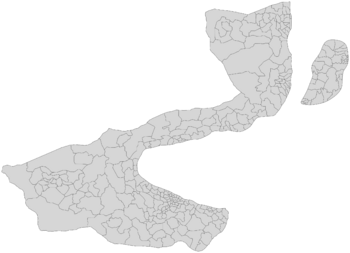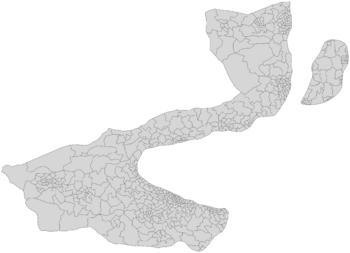Legislative Reform Act 2023 (Monsilva)
| Legislative Reform Act 2023 | |
|---|---|
| Parliament of Monsilva | |
| Territorial extent | Monsilvan Republic |
| Passed by | Legislative Assembly |
| Passed | 6 January 2023 |
| Passed by | Senate |
| Passed | 14 February 2023 |
| Assented to by | President Chiu Zan |
| Assented to | 27 February 2023 |
| Effective | 1 March 2023 |
| Legislative history | |
| First chamber: Legislative Assembly | |
| Bill published on | 13 December 2022 |
| Introduced by | Opposition, Lin Yao-tang |
| First reading | 13 December 2022 |
| Second reading | 29 December 2022 |
| Committee stage | 4 January 2023 |
| Third reading | 6 January 2023 |
| Voting summary |
|
| Second chamber: Senate | |
| Passed with amendments | 12 February 2023 |
| Summary | |
| An act to change the borders of Monsilva's county and district divisions and introducing a new constituency system with the goal of creating fairer elections and an improved distribution of parliamentary seats. | |
| Status: In force | |
| This article is part of a series on the |
| Politics of Monsilva |
|---|
 |
The Legislative Reform Act 2023 is an Act of the Monsilvan Parliament that introduced significant changes to Monsilva's county and district divisions. The main reason behind the changes was to align county boundaries with urban and rural municipality classifications. Originally, a county could consist of multiple municipalities that would be classified as all urban, all rural or a mix of either, the changes to these boundaries would prevent a mix of classifications, and only have counties that had municipalities with one classification or the other. This, in turn, would indirectly classify counties as either rural or urban. The districts, however, would be changed to reflect population as the subdivisions would be too large to always fit to urban and rural classifications. Another reason behind these changes according to FDP Leader, Lin Yao-tang, was to improve fairness in Monsilva's federal and senate elections. According to Lin, this was achieved as voters are less spread out across counties, and instead be among voters with similar voting preferences. In addition, the act instituted a new constituency system for the Legislative Assembly. This system removed counties as electoral districts, instead making them purely geographic, and created a set of constituencies for the Legislative Assembly which increased the number of seats from 254 to 454.
Reforming county and district divisions and introducing an individual constituency system had been a topic for discussion within both the Legislative Assembly and the Senate since 2011, but without success. The topic had become much more popular among Monsilvans in 2018 and 2019, with many petitions and minor protests advocating for changes ranging from county divisions being redrawn to more extreme changes like redrawing states. In late 2019, Xu Yan, the incumbent RNP Prime Minister, made promises that he would attempt to introduce a bill for electoral reform if he was re-elected for a second term. According to polls dating from before and after that announcement, it definitely created a surge in popularity for the Reformed National Party which may have helped them win the next election in August 2020.
The Act came as a series of two acts that were suggested by both the FDP and the Liberal Party after Prime Minister Xu Yan announced he would not introduce any electoral reform bills in May 2022, contrary to his promise to do so after his re-election in the 2020 federal election. The second act, the Electoral Reform Act 2023, entered into its first reading on the 10 March 2023 from Liberal Party Leader, Gao Jingyi.
Contents
Referendum
The Act was submitted to the Legislative Assembly after a successful referendum amongst the voting population asking the question:
"If Monsilva were to redraw its county and districts boundaries in order to create fairer elections through sensible voter distribution, would you be in favor of the change?"
The ballot also showed a map of the original and proposed boundaries, and marking the location of the polling station on both maps.
The referendum was submitted for distribution on the 18 November 2022 and voting took place on 3 December 2022. The results of the referendum are mapped below:
Results
Redrawing of county boundaries
The Act redrew county boundaries, but the number of counties remained at 254. All states were affected by the Act, some more than others. For example, Donguan was barely changed, except for the movement of Guangfu's constituency downwards. While almost all of Maguan's boundaries along the coast were significantly changed to reflect the locations of Maojie and Xinbin's municipalities. Counties were also removed as electoral districts.
Redrawing of district boundaries
The Act also redrew the district boundaries, although it usually followed urban and rural designations for the new counties, it did not always, as the districts were often too large to accurately represent equal amounts of each state's population. This happened in states which only have two or three districts. Unlike counties, districts will remain as electoral districts for the Senate.
Introduction of the legislative constituencies
The Act introduced a legislative constituency system which removed counties as electoral districts and instead uses the new legislative constituencies. The number of constituencies created was 454, which increased the size of the Legislative Assembly by around 79%. Legislative constituencies were created with an apportionment threshold, preventing constituencies with too small of a population and constituencies with absurdly large populations.
Requirement for election
According to the Act, with approval from the government, an election will have to be called by the end of July by the prime minister. This is due to the overhaul of the entire Legislative Assembly system, making politicians' seats no longer exist.
Link to the Electoral Reform Act
The Act was also written in order to link with the proposed Electoral Reform Act which entered into its first reading in March 2023. The Electoral Reform Act will overhaul Monsilva's electoral system, changing it from First-past-the-post to Instant-runoff voting. Proportional representation, including IRV, has been strongly advocated for by many electoral reform groups since the establishment of the Monsilvan Republic in 1978. The announcement of the second bill is the reason behind many RNP Members of the Legislative Assembly to vote for the Legislative Reform Act, despite the party leader being against it.
Map changes








